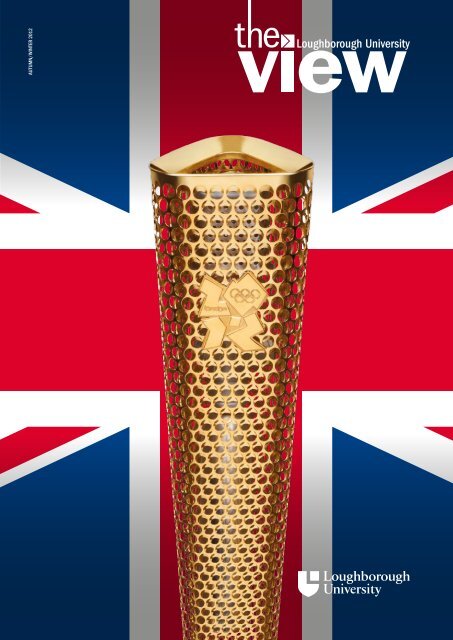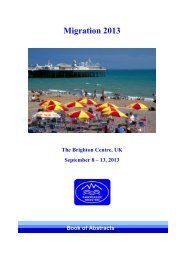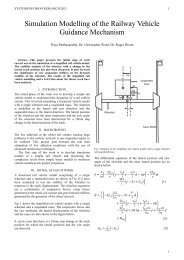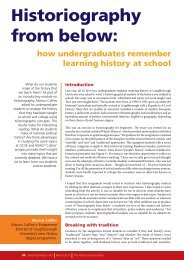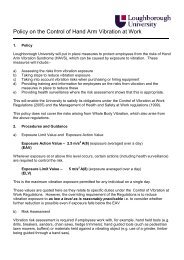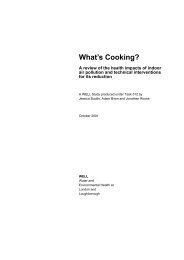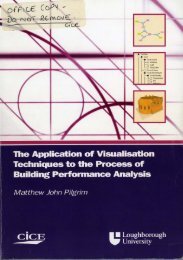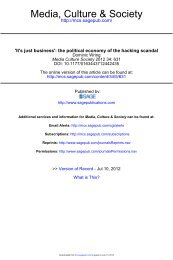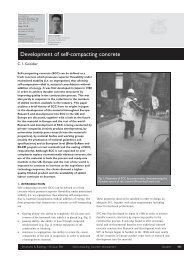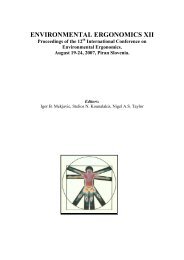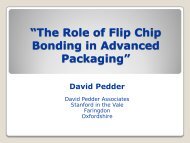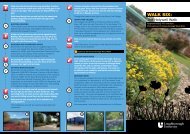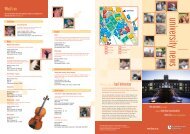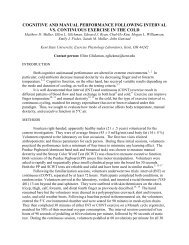Download this issue - Loughborough University
Download this issue - Loughborough University
Download this issue - Loughborough University
Create successful ePaper yourself
Turn your PDF publications into a flip-book with our unique Google optimized e-Paper software.
AUTUMN/WiNTer 2012<br />
<strong>Loughborough</strong> <strong>University</strong>
LOUGHBOrOUGH UNiVerSiTY DPS 51773 OCT 2012 ©<br />
To subscribe free to The View or request extra copies<br />
call +44 (0)1509 222224<br />
or email publicrelations@lboro.ac.uk<br />
For more information about <strong>Loughborough</strong> <strong>University</strong><br />
visit www.lboro.ac.uk<br />
An electronic version of The View can be downloaded from<br />
www.lboro.ac.uk/theview<br />
The View is published by the<br />
Public Relations Office,<br />
Hazlerigg,<br />
<strong>Loughborough</strong> <strong>University</strong>,<br />
Leicestershire, LE11 3TU<br />
T: +44 (0)1509 222224<br />
E: publicrelations@lboro.ac.uk<br />
www.lboro.ac.uk/publicrelations<br />
Editor: Judy Wing<br />
T: +44 (0)1509 228697<br />
E: J.L.Wing@lboro.ac.uk<br />
Design: Design and Print Services,<br />
<strong>Loughborough</strong> <strong>University</strong><br />
T: +44 (0)1509 222190<br />
E: designandprint@lboro.ac.uk<br />
www.lboro.ac.uk/designandprint<br />
Photography: Andrew Weekes<br />
T: +44 (0)7836 566295<br />
and Design and Print Services<br />
Printed by belmont Press<br />
This product is produced using vegetable based inks, using<br />
low VOc (Volatile Organic compounds) printing processes<br />
on FSc certified paper and board, assuring that materials<br />
are sourced from properly managed forests and that<br />
materials have a full chain of custody from source to end<br />
user. The company operates iSO 14001 Environmental<br />
Management System certification, ensuring that all<br />
processes have documented procedures in place with<br />
regard to all environmental aspects.<br />
no part of <strong>this</strong> publication may be reproduced, copied<br />
or transmitted in any form or by any means without<br />
prior permission from <strong>Loughborough</strong> <strong>University</strong>’s Public<br />
Relations Office. The views expressed in the magazine<br />
are not necessarily those of <strong>Loughborough</strong> <strong>University</strong>.<br />
cover story<br />
The greaTesT<br />
show on earTh –<br />
London 2012<br />
The summer of 2012 was an<br />
incredible time for <strong>Loughborough</strong><br />
– Follow its Olympic and<br />
Paralympic Journey.<br />
p4<br />
The GREATEST SHOW On EARTH<br />
the sports view<br />
P4-11<br />
x<br />
the research & enterprise view<br />
The SciEncE OF SiLEncE P12-13<br />
simpLe SOLUTiOnS cHAnGinG LiVES P14-17<br />
The MUScLE MOVEMEnT P18-21<br />
men, MOnEy & Diy DEbT-SOLVinG P22-25<br />
x<br />
the campus view<br />
ambassador, cHAMPiOn, LEADER – VicE cHAncELLOR P26-29<br />
Lord cOE APPOinTED P30<br />
reinvenT THE TOiLET P31<br />
awarded cbE P31<br />
TabLe OF TAbLES P31<br />
<strong>Loughborough</strong> <strong>University</strong>
the greatest<br />
shoW on earth<br />
London 2012<br />
The 2012 London Olympic and<br />
Paralympic Games captivated the<br />
world and will be remembered as one<br />
of the country’s greatest sporting<br />
achievements.<br />
For <strong>Loughborough</strong> the journey began<br />
on 6 July 2005, the day the International<br />
Olympic Committee announced<br />
that London had been selected to<br />
host the 2012 Games.<br />
Given the <strong>University</strong>’s sporting<br />
and academic pedigree it was<br />
clear <strong>Loughborough</strong> would play an<br />
important role. This was underlined<br />
in 2010 when it was selected by<br />
the British Olympic Association<br />
as the Official Preparation Camp<br />
Headquarters for Team GB prior to<br />
the Olympics.<br />
In the years leading up to the Games<br />
<strong>Loughborough</strong> helped train and<br />
prepare more than 90 athletes for<br />
both the Olympics and Paralympics,<br />
and its academic research led to the<br />
development of new training aids and<br />
competition equipment.<br />
The summer of 2012 was an<br />
incredible time for <strong>Loughborough</strong> –<br />
follow its journey.<br />
4 the sports view the sports view 5<br />
Photo: SWpix
the team gB<br />
Preparation<br />
camp comes to<br />
<strong>Loughborough</strong><br />
2012 TimeLine<br />
For seven and half weeks prior<br />
to the start of the London 2012<br />
Games the spotlight was on<br />
<strong>Loughborough</strong> <strong>University</strong> as<br />
the site of the official Team GB<br />
Preparation Camp headquarters.<br />
The Preparation Camp had<br />
two main purposes: firstly<br />
to officially kit out all of the<br />
athletes as part of the Team GB<br />
‘Experience’. Secondly a number<br />
of athletes chose to spend time<br />
at the <strong>University</strong> to utilise the<br />
sporting facilities on campus to<br />
prepare for the Games.<br />
the team gB<br />
experience<br />
524 of the 541 athletes<br />
selected visited the<br />
Preparation Camp to be kitted<br />
out, alongside support staff,<br />
coaches and officials. The<br />
process took approximately<br />
three and a half hours to<br />
complete.<br />
Representatives from all of<br />
the 26 Olympic sports passed<br />
through the camp, based at<br />
the Sir Denis Rooke building in<br />
Holywell Park.<br />
Other areas of the campus<br />
utilised by Team GB included<br />
Burleigh Court, where Team GB<br />
officials and athletes stayed<br />
but also used as their Operation<br />
Office. The new <strong>Loughborough</strong><br />
<strong>University</strong> Stadium was<br />
converted into a media centre,<br />
providing a base for journalists<br />
and broadcasters and a location<br />
for press conferences, team<br />
announcements and photo<br />
opportunities.<br />
The two suppliers of kit were<br />
Next and adidas. The athletes<br />
first visited Next in order to be<br />
measured and fitted for formal<br />
wear and outfits for the Opening<br />
and Closing Ceremonies. During<br />
a six week period Next <strong>issue</strong>d<br />
approximately 80,000 items<br />
of clothing across 64 different<br />
sizes.<br />
After the formal and ceremony<br />
wear the athletes moved onto<br />
Thousands of local residents,<br />
school children and <strong>University</strong><br />
staff gathered on 3 July to<br />
celebrate as the Olympic Torch<br />
Relay wound its way through the<br />
campus.<br />
Among those carrying the<br />
Flame at the <strong>University</strong> was<br />
Nottingham-based athlete<br />
Richard Whitehead, who trains<br />
at <strong>Loughborough</strong>, and went on<br />
to win gold in the 200m at the<br />
Paralympic Games.<br />
The Flame ended its visit to the<br />
campus at the Sir Denis Rooke<br />
building. It was met by 180<br />
members of Team GB’s Olympic<br />
Ambition Programme – young,<br />
talented British athletes who<br />
were given a unique opportunity<br />
to experience the Olympic<br />
Games environment at first<br />
hand <strong>this</strong> summer. Among those<br />
also present at Sir Denis Rooke<br />
were Team GB Deputy Chef de<br />
Mission Sir Clive Woodward,<br />
adidas in order to try on their<br />
podium tracksuit, alongside<br />
village, training and sports<br />
specific competition wear.<br />
Adidas <strong>issue</strong>d approximately<br />
175,000 units of kit across<br />
23 sizes.<br />
As well as kitting out the<br />
athletes also had the<br />
opportunity to sign up to the<br />
five 'One Team GB' core values<br />
and Olympic gold medallist and<br />
Team GB ambassador David<br />
Hemery.<br />
Several of the torch bearers<br />
who took part in the relay<br />
across the country had links<br />
to <strong>Loughborough</strong>, including:<br />
current students Myra Perkins,<br />
Jen Jones, Robert Mohan, Stuart<br />
Gorman and Oliver Hooper; staff<br />
members Myra Nimmo, Ian<br />
Henry, Rachel Thomson, Rich<br />
Smith, Richard Bebbington and<br />
Debs Eagle; and alumni Sue<br />
Campbell, Dan Greaves and<br />
Rebecca Willison.<br />
of performance, respect, unity,<br />
responsibility and pride.<br />
The athletes then spent 25<br />
minutes conducting media<br />
interviews and going through<br />
the experience of a ‘mixed<br />
zone', which was designed to<br />
replicate the experience of<br />
stepping off the field of play at<br />
the Olympic Games and facing<br />
media requests.<br />
Prime Minister<br />
visits <strong>University</strong><br />
Prime Minister David<br />
Cameron paid a special visit<br />
to <strong>Loughborough</strong> <strong>University</strong><br />
to highlight the country-wide<br />
economic benefits of hosting<br />
the Olympic and Paralympic<br />
Games.<br />
Speaking to national and<br />
regional business leaders,<br />
representatives from the tourism<br />
industry and <strong>University</strong> staff,<br />
the Prime Minister gave a<br />
rousing speech focusing on an<br />
‘inspirational’ Games that will<br />
deliver a lasting legacy across<br />
the UK.<br />
Upon his arrival to the campus<br />
the Prime Minister was greeted<br />
by the <strong>University</strong>’s then Vice<br />
Chancellor, Professor Shirley<br />
Pearce, before addressing<br />
more than 150 guests who had<br />
gathered at <strong>Loughborough</strong>’s<br />
High Performance Athletics<br />
Centre for the event.<br />
Following his speech the<br />
Prime Minister visited the<br />
Team GB Experience where<br />
he met members of the Team<br />
GB Volleyball and Basketball<br />
squads, and Team GB<br />
Ambassador James Degale – a<br />
2008 Olympic gold medallist in<br />
boxing.<br />
18th June 19th June 3rd July 4th July 5th July 7th July 19th July 25th July<br />
The Team GB<br />
Preparation Camp<br />
opens, with the rowing<br />
team the first to pass<br />
through the doors.<br />
6 the sports view<br />
Media get the first<br />
behind the scenes<br />
viewing of the Team<br />
GB experience.<br />
olympic Flame<br />
lights up campus<br />
The Olympic<br />
Torch relay visits<br />
<strong>Loughborough</strong><br />
<strong>University</strong>, travelling<br />
throughout the<br />
campus.<br />
The Princess royal<br />
meets the GB<br />
Men’s Basketball<br />
team during a visit<br />
to the Team GB<br />
Preparation Camp at<br />
<strong>Loughborough</strong>.<br />
Prime Minister<br />
David Cameron<br />
visits the campus<br />
to highlight the<br />
country-wide<br />
economic benefits of<br />
hosting the Olympic<br />
and Paralympic<br />
Games.<br />
Crowds gather to see<br />
Jessica ennis<br />
compete at the<br />
<strong>Loughborough</strong><br />
european Athletics<br />
Permit meet.<br />
the taekwondo team enjoy their stay<br />
As well as coming to<br />
<strong>Loughborough</strong> to be kitted out<br />
approximately 200 athletes from<br />
13 sports utilised the facilities<br />
on campus.<br />
One sport that benefitted from<br />
time at <strong>Loughborough</strong> was<br />
taekwondo. As the athletes would<br />
not compete until the end of the<br />
second week the sport decided to<br />
stay away from the Olympic village<br />
until the last minute.<br />
Instead, four athletes along with<br />
coaches and support staff spent<br />
10 days in Burleigh Court and<br />
training out of the David Wallace<br />
Sports Hall, which had a purpose<br />
built competition mat and stage to<br />
replicate the conditions that would<br />
face the athletes at the London<br />
2012 Games.<br />
For taekwondo the sport had its<br />
most successful ever Olympic<br />
Games, with Jade Jones winning a<br />
gold medal and Lutalo Muhammad<br />
winning a bronze.<br />
The Taekwondo team<br />
pass through kitting<br />
out. The squad also<br />
use the <strong>University</strong> as a<br />
training base for their<br />
final preparations for<br />
the Games.<br />
Medal Makers<br />
A key element of having the Preparation Camp<br />
sited at the <strong>University</strong> was the recruitment<br />
of 400 volunteers through the Medal Makers<br />
programme.<br />
The Medal Makers were on hand to support<br />
the delivery of the Preparation Camp. The<br />
volunteers worked across all areas of the camp,<br />
from supporting the kitting out process and the<br />
press operations, providing the security and<br />
assistance for the training venues to managing<br />
the car parks and assisting with the laundry.<br />
Medal Makers clocked up an impressive 11,642<br />
hours of volunteering during the Preparation<br />
Camp. The volunteers ranged in age from 16 to<br />
84 and from all walks of life from students, staff<br />
colleagues and members of the community.<br />
Athletes Dominic King<br />
and Johanna Jackson<br />
are the last Team GB<br />
athletes to be kitted<br />
out – 97% of the<br />
athletes visit the Team<br />
GB experience during<br />
the six weeks.<br />
the sports view<br />
7
A breathing training device<br />
developed at <strong>Loughborough</strong> helped<br />
to prepare Team GB’s Mo Farah to<br />
claim double Olympic gold medal<br />
success in the men’s 5,000 and<br />
10,000 metres.<br />
The innovative device fits around<br />
the lower chest and ribcage to<br />
provide a training load to the<br />
breathing muscles as the chest<br />
expands during breathing. Improved<br />
breathing muscle efficiency means<br />
more oxygen reaches the exercising<br />
muscles leading to increased<br />
strength, power and endurance.<br />
The Nike Oregon Project Team,<br />
which includes Farah and Olympic<br />
10,000 metres silver medallist<br />
Galen Rupp, used RespiBelt as<br />
part of the athletes’ training<br />
preparations.<br />
The device has been developed<br />
over several years at the <strong>University</strong><br />
and by Progressive Sports<br />
Technologies, a spin-out company<br />
from <strong>Loughborough</strong>’s Sports<br />
Technology Institute.<br />
2012 TimeLine<br />
device helps Farah to double gold<br />
27th July 30th July 2nd august 4th august 6th august 7th august 10th august 11th august 12th august<br />
The opening ceremony<br />
for the London 2012<br />
Olympic Games is<br />
held. <strong>Loughborough</strong><br />
has 73 athletes<br />
competing in the<br />
Games for five<br />
different countries.<br />
Photo: SWpix<br />
<strong>Loughborough</strong>-based<br />
gymnast Sam Oldham<br />
helps Team GB to win<br />
the bronze medal in<br />
the men’s team event.<br />
sam oldham (far right)<br />
Sir Chris Hoy wins his<br />
first gold medal in the<br />
men’s Team Sprint at<br />
the velodrome. British<br />
Cycling worked with<br />
<strong>Loughborough</strong> and<br />
adidas to develop ‘hot<br />
pants’ for the team.<br />
‘hot pants’ give<br />
British cyclists<br />
the winning<br />
edge<br />
Heated trousers developed by<br />
experts from the <strong>University</strong>,<br />
British Cycling and global<br />
sports brand adidas were used<br />
by Great Britain’s cyclists in<br />
their successful pursuit of<br />
Olympic glory.<br />
The ADIPOWER muscle<br />
warming pants are fitted<br />
with battery-powered heat<br />
filaments that sit over<br />
the cyclist’s core muscle<br />
groups and maintain their<br />
temperature between<br />
warm-up and the start of an<br />
event. They’re said to perform<br />
a job similar to tyre warmers<br />
in Formula 1 racing, keeping<br />
the muscles heated in a bid to<br />
improve performance.<br />
Mo Farah becomes<br />
the first Briton to win<br />
an Olympic gold medal<br />
in the 10,000 metres.<br />
A breathing training<br />
device – respiBelt<br />
– developed at<br />
<strong>Loughborough</strong> helped him<br />
prepare for the Games.<br />
The trousers were used<br />
by the Team GB’s track<br />
sprint cyclists, including<br />
Sir Chris Hoy who by<br />
winning two gold medals<br />
in the team sprint and<br />
keirin event became the<br />
most decorated British<br />
Olympian of all time.<br />
The <strong>University</strong>’s<br />
Environmental<br />
Ergonomics Research<br />
Centre – part of the<br />
<strong>Loughborough</strong> Design<br />
School – worked<br />
with adidas for<br />
three years on the<br />
project, establishing<br />
the scientific basis<br />
for the trousers.<br />
The research was led<br />
by Professor George<br />
Havenith, PhD student<br />
Steve Faulkner and<br />
Dr Richard Ferguson.<br />
The Team GB<br />
Preparation Camp<br />
closes, with<br />
taekwondo the<br />
final squad to leave<br />
<strong>Loughborough</strong> to<br />
travel down to the<br />
Olympic village.<br />
<strong>Loughborough</strong><br />
olympians at<br />
the 2012 games<br />
Over 70 athletes with<br />
connections to <strong>Loughborough</strong><br />
competed in the London 2012<br />
Olympic Games across 12<br />
different sports and disciplines,<br />
and representing five different<br />
countries.<br />
Seven of the athletes won<br />
Olympic bronze medals<br />
across four different events,<br />
alongside a number of<br />
notable performances and<br />
achievements.<br />
In athletics the stand out<br />
performance came in the high<br />
jump from former <strong>Loughborough</strong><br />
Students’ Athletics Club<br />
member Robbie Grabarz.<br />
Robbie, the current European<br />
Champion, cleared 2.29 metres<br />
to finish in third place alongside<br />
two other competitors to win a<br />
bronze medal.<br />
Former <strong>Loughborough</strong><br />
College student<br />
robbie Grabarz wins<br />
the bronze medal in<br />
high jump.<br />
It was a fitting reward for<br />
Robbie who has broken through<br />
to become a world-class athlete<br />
over the last 12 months.<br />
In the women’s hockey a 3-1<br />
victory for Team GB won the<br />
bronze medal in the third place<br />
play-off match against New<br />
Zealand.<br />
Former and current<br />
<strong>Loughborough</strong> Students<br />
women’s hockey players<br />
Hannah MacLeod, Laura<br />
Unsworth and Nicola White all<br />
played their part in the Team<br />
GB squad that won bronze. It<br />
was a great performance from<br />
the team, who are coached<br />
by <strong>University</strong> graduate Danny<br />
Kerry.<br />
Current and former<br />
<strong>Loughborough</strong><br />
Students’ hockey<br />
players Hannah<br />
MacLeod, Laura<br />
Unsworth and Nicola<br />
White win the bronze<br />
medal after beating<br />
New Zealand 3-1.<br />
In canoeing two <strong>Loughborough</strong><br />
<strong>University</strong> graduates who were<br />
given a lifeline in the sport after<br />
2008 found themselves on the<br />
podium in 2012.<br />
Liam Heath (Industrial Design<br />
and Technology) and Jon<br />
Schofield (Human Biology)<br />
formed a partnership after the<br />
2008 Beijing Games following<br />
an alteration in the Olympic<br />
programme for canoe sprint<br />
which saw the 500 metre<br />
events replaced with shorter<br />
200 metre races.<br />
In the Olympic final Liam and<br />
Jon clinched the bronze medal,<br />
coming in third behind Russia<br />
and Belarus in a time of 34.421.<br />
<strong>University</strong> graduates<br />
Liam Heath and Jon<br />
Schofield win the<br />
bronze medal in the<br />
canoe sprint K2 200<br />
metres event.<br />
<strong>Loughborough</strong>-based Sam<br />
Oldham played his part in a<br />
tremendous performance by<br />
the Team GB men’s gymnasts,<br />
which saw them win the bronze<br />
medal in the team event.<br />
Sam hails from Nottingham<br />
but trains at the <strong>University</strong>’s<br />
Gymnastics Centre.<br />
In the Aquatics Centre there<br />
were a number of notable<br />
individual performances<br />
by <strong>Loughborough</strong>-based<br />
swimmers. A tremendous swim<br />
from Lizzie Simmonds in the<br />
200 metres Backstroke saw<br />
her finish in fourth place.<br />
The <strong>Loughborough</strong> Olympians<br />
also played their part in<br />
basketball, football, handball<br />
and volleyball for which the<br />
London 2012 Games was an<br />
opportunity to showcase their<br />
sports to the public.<br />
The closing ceremony<br />
for the London 2012<br />
Olympic Games is held.<br />
<strong>Loughborough</strong> finishes<br />
the Games with seven<br />
athletes winning<br />
Olympic bronze<br />
medals across four<br />
different events.<br />
8 the research sports view & enterprise view the research & enterprise the sports view 9<br />
Photo: SWpix<br />
Laura Unsworth<br />
Photo: SWpix
2012 TimeLine<br />
Best seats in<br />
the house for<br />
wheelchair<br />
basketball<br />
players<br />
Innovative tailor-made seats,<br />
developed at <strong>Loughborough</strong>,<br />
were used for the first time<br />
by ParalympicsGB for the<br />
wheelchair basketball events<br />
<strong>this</strong> summer.<br />
The seats, which were<br />
individually moulded for each<br />
player to provide the best<br />
possible support, helped<br />
the athletes to improve their<br />
speed, acceleration and<br />
manoeuvrability around the<br />
court.<br />
The seats were developed<br />
with UK Sport funding at the<br />
<strong>University</strong>’s Sports Technology<br />
Institute, which is supported by<br />
the Engineering and Physical<br />
29th august 30th august 1st september 2nd september 4th september 6th september 7th september 9th september<br />
The opening ceremony<br />
for the London<br />
2012 Paralympic<br />
Games is held.<br />
<strong>Loughborough</strong> has 18<br />
athletes competing<br />
in the Games for<br />
ParalympicsGB.<br />
10 the sports view<br />
Sciences Research Council<br />
(EPSRC).<br />
The bespoke seats took the<br />
individual’s size, shape and<br />
particular disability into account<br />
and were developed in close<br />
consultation with the British<br />
men’s and women’s wheelchair<br />
basketball teams.<br />
The women’s<br />
wheelchair basketball<br />
tournament gets<br />
underway, featuring<br />
current <strong>Loughborough</strong><br />
student Laurie<br />
Williams.<br />
The need to revolutionise the<br />
seats was identified as part<br />
of a partner UK Sport project,<br />
led by researchers from the<br />
<strong>University</strong>’s School of Sport,<br />
Exercise and Health Sciences,<br />
to improve the responsiveness<br />
of wheelchairs to basketball<br />
players’ needs.<br />
<strong>Loughborough</strong>-based<br />
richard Whitehead<br />
wins the gold medal<br />
in the T42 200 metres<br />
and psychology<br />
student Claire Williams<br />
claims bronze in the<br />
F11/12 discus.<br />
<strong>Loughborough</strong>-based<br />
athletes Libby Clegg<br />
and Stef reid win silver<br />
medals in T12 100<br />
metres and the F42/44<br />
long jump.<br />
technology<br />
boost for archer<br />
ParalympicsGB athlete Danielle<br />
Brown successfully defended<br />
her Paralympic women’s<br />
compound archery title at<br />
the London 2012 Games.<br />
Danielle has been supported<br />
by the <strong>University</strong>’s Sports<br />
Technology Institute since<br />
2008, after an approach for<br />
assistance in the design and<br />
production of a specialist frame<br />
which would enhance her<br />
performance.<br />
Danielle suffers from reflex<br />
sympathetic dystrophy<br />
in her lower legs and was<br />
previously using a piece of old<br />
bicycle frame as a prop when<br />
competing.<br />
Danielle Brown wins<br />
gold in the women’s<br />
compound archery,<br />
using a specially<br />
developed frame<br />
created by the Sports<br />
Technology institute.<br />
<strong>Loughborough</strong><br />
Paralympians at<br />
the 2012 games<br />
Eighteen athletes with<br />
connections to <strong>Loughborough</strong><br />
competed in the London 2012<br />
Games for ParalympicsGB<br />
across seven different sports<br />
and disciplines.<br />
Six of the athletes won<br />
Paralympic medals<br />
alongside a number of<br />
notable performances and<br />
achievements.<br />
Five of the medals were won<br />
in the Olympic Stadium in the<br />
athletics events.<br />
<strong>Loughborough</strong>-based athlete<br />
Richard Whitehead started the<br />
Paralympic medal rush after<br />
coming from behind to win the<br />
gold in the final of the T42<br />
200 metres.<br />
richard whitehead Claire williams stef reid dan greaves<br />
Photos: All images courtesy of Press Association<br />
The Institute’s team of technical<br />
experts were able to create a<br />
design finely tuned to Danielle’s<br />
requirements, with custom<br />
features to assist the initial set<br />
up and a change of concept to<br />
ensure positional consistency<br />
of the archer.<br />
The modifications ensured there<br />
was consistent positioning of<br />
the lower limbs and that the<br />
total load was spread over a<br />
greater area, making maximum<br />
use of the permitted space.<br />
The redesign eliminated the<br />
sinking of the frame on soft<br />
ground and the wider base made<br />
it much more stable on indoor<br />
shoots.<br />
<strong>University</strong> graduate Dan Greaves<br />
wins silver in the F44 discus.<br />
Ben rushgrove wins the bronze<br />
medal in the T36 200 metres.<br />
Ben has been supported by the<br />
Sports Technology institute and<br />
was the subject of the film BeN,<br />
directed by <strong>University</strong> lecturer<br />
Dr John edwards.<br />
<strong>University</strong> graduate Dan<br />
Greaves claimed the silver<br />
medal in the F44 discus. Dan<br />
broke the Paralympic record<br />
with a season’s best of 59.01<br />
metres, but rival Jeremy<br />
Campbell threw over 60 metres<br />
to win the gold medal.<br />
Stefanie Reid claimed the silver<br />
medal in the F42/44 long jump.<br />
Stef, who is coached by Keith<br />
Antoine at <strong>Loughborough</strong>,<br />
broke the Paralympic record on<br />
two occasions, jumping 5.28<br />
metres.<br />
<strong>Loughborough</strong>-based Libby<br />
Clegg also won a silver medal<br />
in the 100 metres T12 event.<br />
Libby crossed the line with her<br />
guide runner Mikail Huggins in<br />
a lifetime best and European<br />
record time of 12.13.<br />
Current <strong>University</strong> student<br />
Claire Williams won the<br />
bronze medal in the F11/12<br />
discus. Claire, who is studying<br />
Psychology and is a 2012<br />
Sports Scholar, threw 39.63<br />
metres to claim third place.<br />
Away from the track in the<br />
table tennis there was a bronze<br />
medal for <strong>Loughborough</strong> College<br />
student Aaron McKibbin in the<br />
Class 6-8 men’s team event.<br />
There were a number of notable<br />
performances from current<br />
<strong>University</strong> students.<br />
International Relations student<br />
Sam Ruddock ran a personal<br />
best of 28.75 in the heats on<br />
the T35 200 metres. Although<br />
Current <strong>Loughborough</strong><br />
College student Aaron<br />
McKibbon wins bronze<br />
in the table tennis<br />
class 6-8 team event.<br />
not quick enough to qualify for<br />
the final, it was a tremendous<br />
performance by Sam who only<br />
took up athletics a few months<br />
ago.<br />
Finally Geography student<br />
Emma Hollis produced a series<br />
of gutsy swims in the pool<br />
despite having fractured her<br />
ankle less than a week prior to<br />
the Games due to her condition<br />
of brittle bones.<br />
Masters student Crystal<br />
Lane was only selected for<br />
the Games two weeks before<br />
they commenced. But Crystal<br />
recorded top ten finishes in her<br />
three events during her debut<br />
at the Paralympic Games,<br />
including a sixth place in the<br />
Women’s Individual C 4-5 Road<br />
Race held at Brands Hatch.<br />
The closing ceremony<br />
for the London 2012<br />
Paralympic Games is<br />
held. <strong>Loughborough</strong><br />
finishes the Games<br />
with six athletes<br />
winning six medals.<br />
the sports view<br />
11
Noise<br />
control is big business. Industry<br />
and Government spend billions of<br />
pounds every year attempting to protect workers<br />
and communities from the damaging impact of<br />
unwelcome sound. From the rumble of road traffic<br />
to the banging of industrial machinery, solid barriers<br />
are often employed to lessen the noise with varying<br />
degrees of success.<br />
But now a new patented technology, developed by<br />
a team from the <strong>University</strong>’s Department of Physics,<br />
looks set to revolutionise noise control and is<br />
already attracting a lot of interest.<br />
When embarking on a joint undergraduate<br />
research project for their Physics degree, Drs<br />
Daniel Elford and Luke Chalmers had no idea<br />
that five years down the line it would see<br />
them on the brink of launching a brand new<br />
business venture with the <strong>University</strong>. At just<br />
26 years old the friends seem to be taking it<br />
all in their stride.<br />
“We are both really excited about where <strong>this</strong><br />
is heading,” Dr Elford says. “We have had a<br />
lot of support from the department and the<br />
<strong>University</strong>’s Enterprise Office and have been<br />
quite shocked by the positive reaction we<br />
have had from industry.”<br />
Their undergraduate project focused on a<br />
relatively new area of physics called sonic<br />
crystals – a periodic array of sound wave<br />
scatterers that severely reduce sound<br />
in specific frequency ranges. Research<br />
in <strong>this</strong> area was already underway in<br />
the department, led by Professor Feo<br />
Kusmartsev and Dr Gerry Swallowe.<br />
Following the interesting results of their<br />
undergraduate project Professor Kusmartsev<br />
and Dr Swallowe invited the duo to continue<br />
their research through a PhD.<br />
“The PhD went really well,” Dr Elford adds.<br />
“And in our final year we started to realise<br />
that what we had been working on could<br />
have some real commercial use.”<br />
12 the research & enterprise view<br />
Conventional sound barriers are solid<br />
structures built around machinery or<br />
installed along the sides of road or railway<br />
lines. However they are not always effective<br />
and can cause problems with ventilation<br />
and over-heating when used in an industrial<br />
setting.<br />
The sound barriers developed by Drs<br />
Elford and Chalmers have built upon the<br />
extensive research already carried out by<br />
the department. They comprise of a series<br />
of cylinders, precisely arranged to absorb<br />
the frequency of sound waves in a specific<br />
environment. They enable the reduction of<br />
unwanted sound, whilst allowing wanted<br />
noise such as fire alarms to be heard. The<br />
barriers can be constructed from a wide<br />
variety of materials and use typically less<br />
than half of the matter needed for a solid<br />
barrier, making them more cost-effective<br />
than current solutions. Their design can also<br />
be tailored to cut very specific types<br />
of noise.<br />
Dr Chalmers explains: “Basically our<br />
design is made from cylinders in a periodic<br />
row, similar to a fence but with spaces in<br />
between. In spacing the cylinders in a regular<br />
pattern you are able to block out a certain<br />
frequency of sound. This is achieved by<br />
matching the peaks in a sound wave to the<br />
spacing between the cylinders – the sound<br />
gets cancelled out.<br />
“What makes our technology so unique is<br />
the design of the cylinders. A conventional<br />
sonic crystal is a solid cylinder and the sound<br />
control is only determined by the spacing<br />
between each one. To block out the lower<br />
frequency noises the spacing increases so<br />
your barrier gets bigger, making it unfeasible.<br />
The solution we developed involves using<br />
hollow cylinders with a slot cut in, which<br />
introduces a different mechanism to block<br />
out certain frequencies. Using <strong>this</strong> technique<br />
alongside the spacing of the cylinders we<br />
are able to block out even more sound<br />
frequencies at a useable scale.”<br />
To transform their research into a business<br />
venture they have secured commercialisation<br />
funding from the Engineering and Physical<br />
Sciences Research Council, the <strong>University</strong>’s<br />
Enterprise Office, the European Regional<br />
Development Fund and the Royal Academy of<br />
Engineering. This has enabled them to carry<br />
out lab tests at the campus and develop<br />
prototypes. They are now at the stage where<br />
they are testing the technology in actual<br />
industry settings.<br />
“We have our sound barriers in operation at<br />
two industrial sites,” Dr Elford says. “To start<br />
the process we go out to visit the clients<br />
and perform a noise survey. We take noise<br />
measurements and then work out which<br />
frequencies we need to target. We then<br />
tune the barrier to block out those specific<br />
frequencies.<br />
“We offer industry a unique solution to<br />
noise control that is cheaper, targeted at<br />
specific sounds and allows the free flow of<br />
air. The ability to allow air to pass through<br />
is particularly important to industry, where<br />
solid noise barriers enclosing machinery<br />
can lead to over-heating and the need for air<br />
conditioning.”<br />
The response to the new sound barriers<br />
has been incredible, with more that 30<br />
companies spanning the rail and renewable<br />
energy sectors interested in the development<br />
of the technology and its potential uses.<br />
“They all see the value of the new technology<br />
and know that the current options on offer<br />
do not work,” Dr Chalmers adds. “In fact the<br />
interest has been that great that we have<br />
had to turn away some companies until we<br />
are at a stage to be able to help them.”<br />
“We offer industry a<br />
unique solution to noise<br />
control that is cheaper,<br />
targeted at specific<br />
sounds and allows the<br />
free flow of air.”<br />
Drs Elford and Chalmers, alongside<br />
Professor Kusmartsev and Dr Swallowe,<br />
are now working with the Enterprise<br />
Office to establish a <strong>University</strong> spin-out<br />
company. <strong>Loughborough</strong> is renowned for its<br />
successful transfer of academic research<br />
into commercial ventures and Drs Elford and<br />
Chalmers know they are in the best place<br />
possible to develop a business.<br />
“The support we have received from the<br />
<strong>University</strong> has been fantastic,” Dr Elford says.<br />
“<strong>Loughborough</strong>’s reputation has opened a lot<br />
of doors for us in the business community and<br />
we want to retain our strong links with the<br />
<strong>University</strong> as things progress. Ideally we would<br />
like to base the new company at the campus<br />
on the Science and Enterprise Park, it is the<br />
perfect environment.”<br />
the research & enterprise view<br />
13
simple<br />
solutions<br />
783 million<br />
people<br />
in the world do not have access to<br />
safe water. This is roughly one in ten<br />
of the world’s population.<br />
2.5 billion<br />
people<br />
in the world do not have access to<br />
adequate sanitation, almost two<br />
fifths of the world’s population.<br />
diarrhoea<br />
kills<br />
more children every year than AIDS,<br />
malaria and measles combined.<br />
14 the research & enterprise view the research & enterprise view 15<br />
Photo: Water Aid
Living<br />
in the UK it is easy to take the simple things for granted. if you<br />
are thirsty you turn on the tap, if you need the toilet you go.<br />
But for so many people in the world accessing safe drinking water and adequate<br />
sanitation is a daily struggle. Add to <strong>this</strong> a disability, old age or even pregnancy,<br />
doing even the simple things becomes a battle. Judy Wing went to meet Hazel<br />
Jones from the <strong>University</strong>’s Water, engineering and Development Centre (WeDC)<br />
in the School of Civil and Building engineering, whose practical, hands on<br />
approach to help and partnership working is changing people’s lives.<br />
It was 10 years ago that Hazel first started<br />
looking at access to water and sanitation<br />
for people with disabilities as part of a<br />
Department for International Development<br />
(DFID) funded research project.<br />
“Rather than inventing new solutions we<br />
decided to build on existing good practice,”<br />
Hazel explains. “Through the DFID research<br />
we were able to go out and document how<br />
disabled people themselves were modifying<br />
their home environments, the solutions they<br />
had come up with to overcome<br />
problems accessing water,<br />
sanitation and hygiene (WASH). It<br />
was then that we realised that it<br />
wasn’t just disabled people who<br />
were affected – the elderly, the<br />
young, pregnant women, they all<br />
faced problems.”<br />
The information gathered during<br />
the research was analysed and<br />
the technical solutions collated in<br />
a picture-led resource book. More<br />
than 300 copies were distributed to<br />
WASH implementers and disabled<br />
people’s organisations working<br />
in low-income countries. It was<br />
translated into French, distributed<br />
on CD and made available to download from<br />
the WEDC website. For many it was the first<br />
time they had considered the extra barriers<br />
facing disabled people and other vulnerable<br />
groups in accessing water and sanitation.<br />
“The resource book highlighted just how hard<br />
life is for the most vulnerable in low-income<br />
countries, where for many going to the toilet<br />
involves squatting over a pit in the ground,<br />
at best. If you are unable to walk or support<br />
your own weight what do you do? It is a<br />
similar situation with accessing water – if the<br />
hand pump is a kilometre away or difficult to<br />
operate and requires a lot of strength what do<br />
the elderly or very young do?”<br />
WEDC has a long-established relationship<br />
with WaterAid and the DFID-funded research<br />
further cemented the partnership. WaterAid<br />
is an international non-governmental<br />
organisation dedicated to transforming<br />
lives by improving access to safe water,<br />
hygiene and sanitation in the world's poorest<br />
communities. It works in 27 countries with<br />
local partners, providing them with the skills<br />
and support to help communities set up and<br />
manage practical and sustainable projects<br />
that meet their real needs.<br />
16 the research & enterprise view<br />
“Our resource book struck a real chord with<br />
WaterAid,” Hazel adds. “Equity and inclusion<br />
in accessing safe water and sanitation<br />
became an organisational strategy for<br />
WaterAid and at <strong>this</strong> point they came to us to<br />
provide the technical expertise for its staff.”<br />
WEDC were tasked with developing a training<br />
course for WaterAid’s employees – the<br />
people working on the ground in low-income<br />
countries to improve water and sanitation<br />
facilities. The distance-learning package<br />
“it is fantastic to know<br />
that the research we do<br />
here at WEDc is really<br />
helping people in lowincome<br />
countries”<br />
Hazel created is the only one of its kind in<br />
the world. It encourages participants to seek<br />
out achievable solutions, providing them with<br />
examples of what they could do differently and<br />
the practical skills needed through a mixed<br />
mode format of practical distance-learning,<br />
assignments and hands-on workshops.<br />
Today staff from all 27 countries that<br />
WaterAid work in have completed WEDC’s<br />
CPD distance-learning course. “It is fantastic<br />
to know that the research we do here at<br />
WEDC is really helping people in low-income<br />
countries,” Hazel says. “The information<br />
and training based on our original research<br />
is being provided to implementers, disabled<br />
people’s organisations and to communities<br />
to make them think about the needs of the<br />
disabled in their communities, the needs of<br />
the elderly, of pregnant women. Things are<br />
changing for the better for these people.”<br />
So what next? WEDC has now embarked on<br />
a three-year research project with WaterAid<br />
and the Leonard Cheshire Disability and<br />
Inclusive Development Centre based at UCL.<br />
The purpose of the research is to examine<br />
what the problems are that prevent access to<br />
clean water and basic sanitation for disabled<br />
and elderly people in Uganda and Zambia. It<br />
will look at what interventions are effective in<br />
improving access and the impact <strong>this</strong> has on<br />
their lives and those of their families, including<br />
economic, health and social status.<br />
The first phase of the research will focus on<br />
the impact of lack of access in<br />
three areas: livelihoods; health;<br />
and social participation, and<br />
identify the barriers preventing<br />
access. The second phase of<br />
the research will assess how<br />
improved access to water and<br />
sanitation facilities affects both<br />
individuals with disabilities and<br />
their households.<br />
“It is great to be able to continue<br />
pushing forward with the work<br />
and to keep it in the minds of<br />
policy makers,” Hazel adds. “This<br />
research project will enable us to<br />
get a deeper insight into the real<br />
impact lack of access to clean<br />
water and basic sanitation has on people with<br />
a disability, and what a difference improving<br />
access can make. As with all the work we do<br />
here at WEDC, it is about improving people’s<br />
quality of life.”<br />
<strong>Loughborough</strong> <strong>University</strong>’s Water, Engineering<br />
and Development Centre (WEDC) is a worldleading<br />
education and research institute. Part<br />
of the School of Civil and Building Engineering,<br />
the organisation specialises in developing<br />
knowledge and capacity in water supply and<br />
sanitation in developing countries.<br />
changing<br />
lives<br />
the research & enterprise view<br />
Photo: Water Aid<br />
17
18 the research & enterprise view<br />
<strong>Loughborough</strong><br />
researchers are engineering t<strong>issue</strong><br />
that looks and behaves like human<br />
muscle. There is future potential to<br />
implant <strong>this</strong> t<strong>issue</strong> into patients who<br />
have lost muscle through surgery,<br />
accidents, or through sport injuries.<br />
Furthermore, studying these muscle<br />
models as they are ‘stimulated’ in<br />
the laboratory, could help researchers<br />
prescribe exercises for older people,<br />
and help those with degenerative and<br />
neuromuscular diseases. This science<br />
could also address strength questions<br />
for elite athletes, and perfect training<br />
regimes.<br />
Professor Mark Lewis of <strong>Loughborough</strong>’s<br />
School of Sport, Exercise and Health<br />
Sciences spoke with Ally Laing about<br />
the implications of <strong>this</strong> research for the<br />
health and wellbeing of society. And he<br />
explains why he believes collaboration<br />
is key to future breakthroughs.<br />
the research & enterprise view<br />
19
20 the research & enterprise view<br />
Investment in sport and exercise<br />
medicine is on the rise. New<br />
multi-million pound institutes of<br />
expertise have been established,<br />
including one at <strong>Loughborough</strong><br />
<strong>University</strong>. These ‘hubs’ bring together<br />
clinicians, scientists, engineers and<br />
researchers, all under one roof, experts<br />
such as <strong>Loughborough</strong>’s Professor of<br />
Musculoskeletal Biology, Mark Lewis.<br />
Their compelling, collaborative research<br />
could result in therapies that will improve<br />
the quality of life for millions of people,<br />
and help prevent diseases related to<br />
inactivity.<br />
Professor Lewis explained: “Advances in<br />
t<strong>issue</strong> engineering, regenerative medicine<br />
and stem cell technology mean we can now<br />
‘make’ a piece of muscle that mimics how<br />
human muscle behaves. Our in vitro muscle<br />
models are around two centimetres long.<br />
“There is potential to grow muscle for<br />
transplants and reconstruction. We are<br />
working with orthopaedic surgeons to look<br />
at how we can attach muscle to bone for<br />
reconstructive surgery and sports injuries.<br />
We are also exploring how to grow muscles<br />
and nerves together.”<br />
He added: “During the past three to<br />
five years we have got to the point at<br />
<strong>Loughborough</strong> where we are really starting<br />
to push and interrogate the systems we have<br />
built over previous decades. We are moving<br />
forward at some pace.”<br />
The challenge is to<br />
use the huge potential<br />
of exercise as a<br />
therapeutic tool.<br />
To make muscle perform in ‘mini gyms’ in<br />
the laboratory, the team uses two systems.<br />
One is a mechanical system, where a<br />
stepper motor is attached to the muscle and<br />
‘stretches’ it. The motor can be set at any<br />
variable researchers choose, so they can<br />
really exercise the muscle hard and introduce<br />
lots of different regimes that simulate<br />
different types of exercise or performance.<br />
The other system used to test muscle<br />
performance is to use electrodes (an electric<br />
current) to stimulate it, to make it ‘twitch’.<br />
Researchers can use these models to<br />
understand muscle physiology in the<br />
laboratory, but transferring <strong>this</strong> science<br />
to the wider population is where the real<br />
legacy lies.<br />
Professor Lewis said: “The challenge is<br />
to use the huge potential of exercise as<br />
a therapeutic tool. Whether it’s a cancer<br />
patient, a respiratory patient, a cardiac<br />
patient or a diabetic patient, if we can<br />
introduce exercise into their treatment<br />
programme, they will benefit, but it needs<br />
to be prescribed specifically.<br />
“A term that’s used a lot now is personalised<br />
medicine. It’s about designing medicines that<br />
are specific to an individual. What we need<br />
to be able to do is get evidence out there to<br />
medics. That’s what we are working towards,<br />
a personalised exercise prescription, so<br />
people exercise better and live longer.”<br />
Professor Lewis and his team are now in<br />
their final year of a three-year research<br />
programme which cost £500,000 to fund.<br />
He explained that one of the most rewarding<br />
parts of his research in recent years has been<br />
collaboration. He has been inspired through<br />
working with colleagues in world-class<br />
facilities such as the National Centre for<br />
Sport and Exercise Medicine, which has<br />
hubs in the East Midlands (at <strong>Loughborough</strong>),<br />
in London and Sheffield. Also with peers in<br />
respected institutions such <strong>University</strong> College<br />
London Hospitals (UCLH), and partnership<br />
work with UCL (<strong>University</strong> College London),<br />
Nottingham <strong>University</strong> and at Keele<br />
<strong>University</strong>, among others.<br />
Professor Lewis said: “You find yourself in<br />
a room with electrical engineers, chemical<br />
engineers, sport scientists and sports<br />
medics, bio-chemists and biologists who<br />
historically would never have had the<br />
occasion or opportunity to meet and talk. I<br />
find these interactions very exciting, and I’ve<br />
been surprised at just how well it all works.<br />
“Collaboration is the future. There are too<br />
many big <strong>issue</strong>s and not enough resources<br />
to give everyone a bit each. I believe<br />
collaboration is a paradigm for the way the<br />
world is going to be, going forward, certainly<br />
in research and development and in ideas<br />
and industry.”<br />
He concluded: “It’s people coming together<br />
with open hearts and open minds. And when<br />
you get the right people in a room, with the<br />
right mindsets, you can get lots done.”<br />
want to know more?<br />
Visit: www.lboro.ac.uk/departments/ssehs<br />
Contact: professor mark Lewis<br />
Email: hos-ssehs@lboro.ac.uk<br />
the research & enterprise view<br />
21
MEN<br />
MONEY<br />
&<br />
debt solving<br />
22 the research & enterprise view<br />
the the research & enterprise view 23
charities have long acknowledged that more<br />
XXXX women than men use their services. Women also<br />
tend to seek that advice early, before a cash crisis spirals out of<br />
control. So what’s preventing men getting the debt advice they<br />
need? How can debt charities break down these ‘barriers’ and<br />
encourage more men to come forward and deal with their debts?<br />
A leading financial charity commissioned Dr Jackie Goode and her<br />
team at <strong>Loughborough</strong>’s Centre for Research in Social Policy, to<br />
explore the sociological and psychological factors affecting men<br />
and debt. Dr Goode spoke with Alison Laing about the findings.<br />
The UK’s economic woes are well<br />
documented. Financial experts say we are in<br />
recession with little sign of recovery anytime<br />
soon. As a consequence, household debt<br />
is on the rise. While debt charities report a<br />
slight increase in the number of enquiries<br />
from men, <strong>this</strong> trend is against an underlying<br />
background of gender imbalance. Typically,<br />
it is still the case that women are the most<br />
likely to seek help with their debts, while<br />
men need more of a ‘push’.<br />
Dr Goode conducted research into these<br />
behaviours on behalf of the Money Advice<br />
Trust. It was a project she and her team took<br />
on with relish.<br />
Dr Goode said: “There is a whole body of<br />
scholarship out there on what happens<br />
to money in households. That research<br />
has mainly focused on women, for very<br />
good reason. In low income households in<br />
particular, it tends to be women who manage<br />
the household budget on a day-to-day basis.<br />
Female partners are also more willing to<br />
come forward and discuss their money<br />
problems than men.<br />
“But what made <strong>this</strong> research project<br />
so exciting, and quite unique, was that it<br />
provided a rare opportunity to hear men’s<br />
24 the research & enterprise view<br />
voices on the subject of debt. What did they<br />
see as their role in managing household<br />
finances? And just how did their overindebtedness<br />
occur?”<br />
The £20,000, small-scale, exploratory study<br />
took three months to complete. The male<br />
volunteers were recruited on the doorstep<br />
by a specialist agency. Some were in couple<br />
households, some were lone male parents,<br />
and one lived in a house share. Just over half<br />
were in households in receipt of an income<br />
of under £15,000 per annum, a quarter were<br />
in receipt of less than £25,000 a year, two<br />
were in receipt of between<br />
£30,000 - £40,000, and<br />
one was in receipt of<br />
£42,000. The interviews<br />
lasted on average 90<br />
minutes, and each<br />
was personally<br />
conducted in<br />
the<br />
Dr Jackie Goode<br />
individual’s home by either Dr Goode or her<br />
colleague, Dr Amanda Waring.<br />
Dr Goode said: “Getting a good sample of<br />
men willing to sign-up for the study proved<br />
difficult. The specialist agency we employed<br />
to recruit volunteers experienced much<br />
resistance. A phrase that kept coming up<br />
was ‘male pride’. We found <strong>this</strong> feedback<br />
from the agency very useful, as it alerted us<br />
to an <strong>issue</strong> we would later follow up in the<br />
interviews.”<br />
Dr Goode continued: “To get an overall<br />
picture of over-indebtedness in each<br />
individual household we began with some<br />
factual questions, such as what kinds of<br />
debts they had, at what level, whether they<br />
had ever sought professional advice, and if<br />
not, why not?<br />
“Then we introduced a set of topics which<br />
were more conversational and exploratory.<br />
We wanted to understand how men managed<br />
on a day-to-day basis and what strategies<br />
they employed to cope with debt. It’s simply<br />
not the case that you have manageable<br />
debts one day, and the next you are overindebted.<br />
It’s an unfolding process, and they<br />
began telling us their stories.”<br />
“Men seem to take a ‘do-ityourself’<br />
approach to overindebtedness.<br />
They feel it’s<br />
their responsibility to get<br />
themselves out of trouble”<br />
In looking at the routes into over-indebtedness,<br />
Dr Goode and her team found that<br />
arrears on bills and rent were most typical,<br />
but relationship breakdowns also figured,<br />
(either where a man had to manage debts<br />
himself for the first time, or where he became<br />
liable for a financial settlement). Drug and<br />
gambling addiction were also mentioned.<br />
Dr Goode explained one of the research<br />
outcomes, and perhaps key to why men leave<br />
it so late to seek advice, centered on male<br />
identity <strong>issue</strong>s. She said: “Men seem to take<br />
a ‘do-it-yourself’ approach to over-indebtedness.<br />
They feel it’s their responsibility to<br />
get themselves out of trouble. Women may<br />
feel empowered by being able to manage<br />
a tight budget, but men often believe they<br />
should be the providers for their families and<br />
are embarrassed to share their problems<br />
with friends, family or professional services,<br />
meaning debt frequently worsens over time.”<br />
Dr Goode added: “It’s important to recognise<br />
that the provider, or breadwinner, identity is<br />
still out there. Men are often judged on<br />
the money that they earn, or don’t earn.<br />
Traditionally, unemployment<br />
has been an attack on<br />
men’s identity. If a man is a<br />
high earner, that enhances his identity.<br />
This male pride and do-it-yourself attitude<br />
– in relation to problematic debt – is a new<br />
finding. I don’t think it’s been properly<br />
explored in <strong>this</strong> context before.<br />
“There are clearly many complex<br />
psychological and sociological factors at<br />
play here. If debt advisors could frame their<br />
marketing messages to men as “providers”<br />
or as “caring for their family” in seeking<br />
advice they may find <strong>this</strong> appeals, and could<br />
encourage more men to come forward.”<br />
New technologies also played their part in<br />
how men managed household income.<br />
Dr Goode said: “We noted some men took<br />
pride in using technology to keep track<br />
of their money. They’d shop around, move<br />
their cash about to secure better<br />
rates of interest,<br />
get text alerts when<br />
nearing their overdraft<br />
limit. Online banking and<br />
telephone banking gave them<br />
a sense of control over their<br />
finances. Some tried to make ‘clever’<br />
investments and saw <strong>this</strong> as ‘beating the<br />
system’, but the danger here was that <strong>this</strong><br />
could also lead to over-indebtedness.<br />
“Because men appeared to be both<br />
confident and competent at using these<br />
new technologies, we suggested to debt<br />
charities that some of the products they have<br />
developed, such as online self-help tools, may<br />
have particular appeal to male consumers.”<br />
Another barrier to men seeking advice<br />
was the mistrust that arose from being<br />
unable to distinguish between the free and<br />
independent advice offered by financial<br />
charities, and that of the commercial debtmanagement<br />
companies. The <strong>Loughborough</strong><br />
team suggested charitable groups emphasise<br />
their free and independent status.<br />
Dr Goode said: “From the sample of men we<br />
studied, those who had sought advice from<br />
debt charities told us they found it extremely<br />
useful, which was encouraging.”<br />
Visit: www.lboro.ac.uk/departments/ss/staff/goode<br />
Contact: dr Jackie goode<br />
Email: J.e.goode@lboro.ac.uk<br />
Publication: Goode, J. and Waring, A. (2011) Seeking direction: Men,<br />
money advice and the road to financial health. CRSP/Money Advice Trust<br />
the research & enterprise view<br />
25
Ambassador,<br />
champion, leader -<br />
Vice Chancellor<br />
26 the campus view<br />
He<br />
has been at the <strong>University</strong> for a matter of weeks<br />
but already Professor Robert Allison – the new<br />
Vice Chancellor – has been bowled over by the<br />
‘<strong>Loughborough</strong> Experience’.<br />
the campus view<br />
27
his appointment follows an incredibly successful career in<br />
academia and he brings to the <strong>University</strong> a wealth of knowledge.<br />
Judy wing went to meet <strong>Loughborough</strong>’s new leader.<br />
It is clear from the start that Professor Allison is a<br />
very charismatic and engaging individual. His desire<br />
to learn all he can about his new ‘home’ highlights<br />
the passion he already has for the <strong>University</strong>, and<br />
he certainly did his homework before coming to<br />
<strong>Loughborough</strong>.<br />
“I actually met all the available former Vice<br />
Chancellors and Chairs of the <strong>University</strong><br />
Council,” Professor Allison explains. “It was a<br />
great way to get a real feel for <strong>Loughborough</strong>,<br />
as well as an insight into what life as Vice<br />
Chancellor at <strong>Loughborough</strong> would be like.”<br />
Has <strong>Loughborough</strong> met his expectations?<br />
“My first few weeks here have been<br />
incredible,” Professor Allison adds.<br />
“The welcome I have received has been<br />
tremendous. My overwhelming impression<br />
from everyone I have met so far, staff and<br />
students, is their passion for <strong>Loughborough</strong>,<br />
their dedication to its continued success.<br />
There is a real sense of community here.”<br />
So what attracted him to <strong>Loughborough</strong>?<br />
“Everyone knows <strong>Loughborough</strong> has<br />
something special, something unique,”<br />
Professor Allison explains. “We are<br />
consistently ranked in the top 20 of national<br />
league tables, our research is internationally<br />
acclaimed, we attract high-calibre students,<br />
our work with industry is the envy of other<br />
institutions, and of course our sporting<br />
pedigree is second to none. Need I say<br />
more?”<br />
But being a Vice Chancellor is not for the faint<br />
hearted, as a glance at Professor Allison’s diary<br />
highlights – virtually every day for the next six<br />
months he has a meeting, conference, visit or<br />
event to attend.<br />
“There are a number of planks to being a<br />
Vice Chancellor, the first is working with<br />
colleagues to set the vision for the <strong>University</strong><br />
and supporting those colleagues in delivering<br />
it. Secondly it is to be the ambassador for<br />
<strong>Loughborough</strong>, and I hope the <strong>University</strong><br />
community will be proud of the way I am<br />
representing them. Thirdly it is helping<br />
ensure the <strong>University</strong> maintains its high<br />
standards and can constantly adapt to the<br />
challenges that come along.<br />
“Fulfilling all of these roles means I will<br />
be incredibly busy, but I know it will be<br />
immensely rewarding.”<br />
Professor Allison has taken over from Professor<br />
Shirley Pearce, who stood down as Vice Chancellor<br />
in July after seven years in the post.<br />
“Shirley has done a fantastic job at<br />
<strong>Loughborough</strong> and given me outstanding<br />
support,” Professor Allison adds. “There<br />
is nothing here that we need to fix, it is all<br />
about building on our existing success.<br />
“That isn’t to say there aren’t any challenges<br />
ahead. Universities across the country are<br />
facing difficult times. Changes to funding,<br />
student admissions and greater competition<br />
on a global scale are all <strong>issue</strong>s we will<br />
have to face. We need to make sure that<br />
<strong>Loughborough</strong>’s success is increasingly<br />
recognised not only in the UK but around<br />
the world. We also need to be clear about<br />
what we can offer prospective students and<br />
28 the campus view<br />
staff. If we get <strong>this</strong> right, people will want<br />
to join the <strong>Loughborough</strong> family. I believe<br />
<strong>Loughborough</strong> is in a great position to meet<br />
all these challenges head on.”<br />
<strong>Loughborough</strong> is renowned for its strong partnerships<br />
with business, and has an enviable track record in<br />
commercialising leading edge research from the<br />
<strong>University</strong>. What is Professor Allison’s message to<br />
those in the business community yet to come into<br />
contact with <strong>Loughborough</strong>?<br />
“For those who haven’t yet experienced<br />
<strong>Loughborough</strong> first hand, I would urge<br />
them to pay us a visit,” he says. “The<br />
things that we are good at here, we are<br />
really, really good at. Working with industry<br />
is something we excel at and the ways<br />
in which we can work with industry are<br />
diverse. We can provide businesses with<br />
access to some of the top academics in<br />
their fields and amazing research facilities.<br />
Our existing relationships with leading blue<br />
chip companies – the Rolls Royce <strong>University</strong><br />
Technology Centre, the Caterpillar Innovation<br />
and Research Centre and a bespoke PhD<br />
programme with adidas, to mention just a<br />
few – speak for themselves.”<br />
It is clear the next 12 months will be a whirlwind of<br />
activity for <strong>Loughborough</strong>’s new VC. But what does<br />
Professor Allison want to achieve over the next 12<br />
months?<br />
“The priority for me at present is to listen,<br />
learn and understand as much as I can<br />
about the <strong>University</strong>,” he explains. “Before<br />
arriving at the campus I heard the term<br />
the ‘<strong>Loughborough</strong> Experience’ mentioned<br />
– the unique experience on offer here.<br />
Since starting my role I have been fully<br />
indoctrinated into <strong>this</strong>, we offer students and<br />
staff an incredible package and I want to<br />
learn as much about it as possible. We also<br />
need to reflect on our current position and<br />
think about what we want to achieve next,<br />
so that we are proactively determining our<br />
future. Two questions I have already been<br />
asking colleagues are where do we want to<br />
be 10 years from now and what will it take<br />
to get us there? If we can answer those<br />
questions, set a high level of aspiration and<br />
if everyone involved in <strong>Loughborough</strong> works<br />
towards a shared vision I don’t think we’ll<br />
go far wrong.<br />
“By the end of the year I want to be in a<br />
position where I have met as many people<br />
as possible at the <strong>University</strong>, and our many<br />
external partners. I want to have consulted<br />
widely, sought views from everyone that is<br />
passionate about <strong>Loughborough</strong> and works<br />
to maintain us as one of the UK’s leading<br />
universities. More importantly I want to give<br />
them a chance to meet me. I do not want to<br />
be a Vice Chancellor that is known by name<br />
and not face also.<br />
“The welcome I have received has<br />
been tremendous. My overwhelming<br />
impression from everyone I have<br />
met so far is their passion for<br />
<strong>Loughborough</strong>...”<br />
BiogrApHy<br />
1982 – Graduated from<br />
the <strong>University</strong> of<br />
Hull with a BA in<br />
Geography<br />
1985 – Awarded a PhD<br />
from King’s<br />
College London<br />
1986 – Becomes the<br />
Addison Wheeler<br />
Research Fellow<br />
at the <strong>University</strong><br />
of Durham<br />
1989 – Appointed<br />
Lecturer in<br />
Engineering<br />
Sedimentology<br />
at <strong>University</strong><br />
College London<br />
1993 – Takes up a<br />
lectureship at<br />
the <strong>University</strong> of<br />
Durham<br />
1999 – Appointed<br />
Professor of<br />
Geography<br />
2000 – Becomes Head of<br />
the Department<br />
of Geography at<br />
Durham<br />
2002 – Appointed the<br />
Executive Dean<br />
of the <strong>University</strong>’s<br />
Faculty of Social<br />
Sciences and<br />
Health<br />
2006 – Moves to the<br />
<strong>University</strong> of<br />
Sussex as Pro<br />
Vice Chancellor<br />
2010-2011 –<br />
Serves as the<br />
<strong>University</strong>’s<br />
Deputy Vice<br />
Chancellor<br />
2012 – Joins<br />
<strong>Loughborough</strong><br />
<strong>University</strong> as<br />
Vice Chancellor<br />
DIGITAL CONTACT<br />
Greyscale<br />
CMYK RGB<br />
Brightness/Contrast<br />
MODEL PROGRAM LENS ISO LIGhTING APERTURE RESOLUTION hDR<br />
Nikon D4 Manual 50-200mm 800 Flashgun Various 4928x3280 No<br />
CAMERA<br />
VC<br />
Title The <strong>Loughborough</strong> <strong>University</strong> View<br />
Date 7/September/2012<br />
the campus view<br />
29
Lord Coe appointed<br />
as pro Chancellor<br />
Sebastian Coe,<br />
Lord Chairman of the<br />
London Organising Committee<br />
of the Olympic and Paralympic<br />
Games (LOCOG) and one of<br />
Britain’s greatest athletes,<br />
has been appointed as a Pro<br />
Chancellor of the <strong>University</strong>.<br />
As Pro Chancellor, Lord Coe is a member of the<br />
<strong>University</strong>’s Council (its governing body), which<br />
is comprised of leading figures from local and<br />
national organisations and businesses, as well<br />
as elected <strong>University</strong> staff and representatives<br />
from the Students’ Union.<br />
Lord Coe is an alumnus of <strong>Loughborough</strong>,<br />
having graduated with a BSc in Economics<br />
and Social History in 1979. He was made an<br />
Honorary Doctor of Technology (Hon DTech)<br />
by the <strong>University</strong> in 1985.<br />
As a sportsman he was part of the golden era<br />
of British athletics.<br />
Initially coached by his father, who designed<br />
workouts specifically for his son, Coe won his<br />
first major race in 1977 – an 800m event at<br />
the European indoor championships in San<br />
Sebastián, Spain. At <strong>Loughborough</strong>, he met<br />
athletics coach George Gandy, who developed<br />
revolutionary conditioning exercises to improve<br />
his running.<br />
Coe won gold in the 1,500m and silver in the<br />
800 metres at both the 1980 Moscow and<br />
1984 Los Angeles Olympic Games. He also won<br />
gold in the 800 metres at the 1986 European<br />
Athletics Championships in Stuttgart, and set<br />
a total of eight outdoor and three indoor world<br />
records.<br />
Following his retirement from athletics in 1990,<br />
he served as a Conservative MP and, in 2000,<br />
was made a life peer. In 2006, Lord Coe was<br />
appointed a Knight Commander of the Order<br />
of the British Empire.<br />
Lord Coe played a leading role in winning<br />
the bid for the London 2012 Games, with his<br />
inspirational presentation to the International<br />
Olympic Committee a key moment in the<br />
bid’s success.<br />
Of his appointment, Lord Coe said:<br />
“I have always had very strong links with<br />
<strong>Loughborough</strong>, and I am looking forward<br />
to being able to contribute to the future of<br />
the <strong>University</strong> which provided me with such<br />
support, as both a student and graduate<br />
and also in my athletics career.”<br />
30 the campus view<br />
reinvent the Toilet<br />
Challenge awarded<br />
prize by bill gates<br />
<strong>Loughborough</strong><br />
has won a<br />
prestigious<br />
prize of $60,000 in an international competition<br />
organised by The Bill and Melinda Gates Foundation<br />
to develop a reinvented toilet.<br />
The challenge was to create a toilet that is clean,<br />
safe, durable and affordable for the poor without<br />
the need for connection to electricity or a sewer.<br />
The toilet had to be a viable solution in wealthy<br />
nations as well as in the developing world, where<br />
2.5 billion people lack access to safe and affordable<br />
sanitation.<br />
The prize was awarded to the <strong>Loughborough</strong> team<br />
for its prototype toilet which aims to convert<br />
human waste into carbonised material to provide<br />
heat, minerals for soil conditioning, and water for<br />
flushing and hand-washing. It uses a process called<br />
Continuous Thermal Hydrocarbonisation which kills<br />
all pathogens to create safe to handle, valuable<br />
material and uses power from heat generated during<br />
processing. The toilet is designed to work in both<br />
single-family and multi-user contexts with daily<br />
running costs of just a few pence per person.<br />
Three prototype technologies were recognised<br />
for most closely matching the criteria for the<br />
<strong>Loughborough</strong> climbs<br />
up ‘Table of Tables’<br />
The<br />
<strong>University</strong> has risen a further two places<br />
to be ranked 13th in the Times Higher<br />
Education (THE) ‘Table of Tables’, placing it firmly<br />
among the very best universities in the country.<br />
The THE table is based on the combined results of<br />
the UK university leagues compiled by The Times,<br />
The Guardian and the Complete <strong>University</strong> Guide.<br />
<strong>Loughborough</strong>’s continued high rankings in national<br />
league tables is a reflection of the commitment of<br />
everyone at the <strong>University</strong> to providing the highest<br />
quality learning environment and an outstanding<br />
all-round student experience.<br />
Reinvent the Toilet Challenge. <strong>Loughborough</strong> was<br />
awarded second prize, with the California Institute<br />
of Technology and the <strong>University</strong> of Toronto<br />
respectively receiving first and third prizes.<br />
“Innovative solutions change people’s lives for the<br />
better,” said Foundation Co-chair Bill Gates. “If we<br />
apply creative thinking to everyday challenges, such<br />
as dealing with human waste, we can fix some of<br />
the world’s toughest problems.”<br />
Almost one year ago, the Foundation challenged<br />
universities to design toilets that can capture and<br />
process human waste without piped water, sewer<br />
or electrical connections, and transform human<br />
waste into useful resources. Eight universities from<br />
around the world were chosen for the challenge.<br />
<strong>Loughborough</strong> was the only UK university to be<br />
awarded a grant, receiving $400,000 for research.<br />
Professor M. Sohail, <strong>Loughborough</strong>’s project lead,<br />
said, “It was the opportunity of a lifetime to present<br />
our research to Mr Gates and we are extremely<br />
honoured to receive <strong>this</strong> prestigious award.”<br />
“<strong>Loughborough</strong> <strong>University</strong> has an outstanding<br />
reputation for applying its cross-cutting research<br />
to tackle global <strong>issue</strong>s,” added Professor Myra<br />
Nimmo, the <strong>University</strong>’s Pro Vice Chancellor for<br />
Research. “This challenge has brought together our<br />
experts in sanitation, chemical, materials and water<br />
engineering and design. I am delighted that their<br />
expertise has been recognised with <strong>this</strong> prestigious<br />
award.”<br />
professor<br />
awarded Cbe<br />
Harriet<br />
Ward, Professor of Child and<br />
Family Research at the <strong>University</strong>,<br />
was awarded a CBE for services to children and<br />
families in the Queen’s Birthday Honours list.<br />
Professor Ward is Director of <strong>Loughborough</strong>’s<br />
renowned Centre for Child and Family Research<br />
(CCFR), which she co-founded in 2001. She also<br />
co-directs the government-funded Childhood<br />
Wellbeing Research Centre – a partnership between<br />
the Institute of Education, <strong>University</strong> of London,<br />
<strong>Loughborough</strong> <strong>University</strong>, and the Personal Social<br />
Services Research Unit (PSSRU) at the <strong>University</strong><br />
of Kent.<br />
The work of Professor Ward and her CCFR colleagues<br />
is influential both nationally and internationally,<br />
providing the evidence base for the development of<br />
a wide range of policy initiatives, particularly those<br />
relating to children in need.<br />
Her leadership of the Looking After Children<br />
programme, from which much of the CCFR research<br />
programme originally derived, has influenced<br />
government policy and practice in the UK and<br />
abroad. It also led to a number of research initiatives,<br />
which informed the development of the CCFR<br />
programmes of research on outcomes for vulnerable<br />
children and exploring costs and outcomes.<br />
She is currently directing a major research study<br />
on young children who are suffering, or are likely<br />
to suffer, significant harm, and has recently<br />
co-authored Safeguarding Children Across Services:<br />
Messages from Research on Identifying and<br />
Responding to Child Maltreatment, the overview<br />
of the Department of Health- and Department for<br />
Education-funded Safeguarding Children Research<br />
Initiative.<br />
Speaking about her CBE Professor Ward said: “I am<br />
delighted to have received <strong>this</strong> prestigious honour.<br />
The work that we undertake at the Centre for Child<br />
and Family Research has a real impact on society<br />
and I think all the CCFR team should share the credit<br />
for its many achievements.”<br />
the campus view<br />
31
www.lboro.ac.uk<br />
YouTube<br />
follow @lborouniversity<br />
www.facebook.com/lborouniversity<br />
www.youtube.com/lborouniversity


